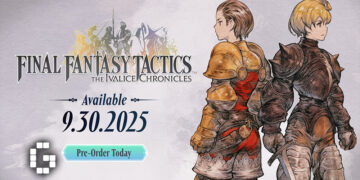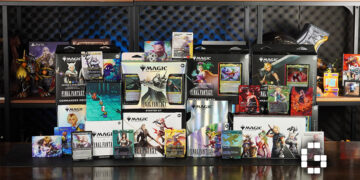Mecha is itself a niche genre. Yet, within Mecha lies its own more niche sub-genre, the mecha tactics game. Dual Gear is an entry into that niche sub-genre. Developed by a small team of Thai developers, it’s a game teeming with passion for the mecha genre.
The Inherent Beauty Of Dual Gear
Looking at Dual Gear, you wouldn’t believe it was an indie game at first. The game looks impressive, with mechs that very much evoke the feeling of Front Mission. The environments you get to play on in the early access build are equally impressive, with plenty of points of cover.
The soundtrack is also impressive, with that hard techno beat perfect for planning your next move. More important than being good, the team made sure the game feels authentic. The developer’s decision to use a Japanese voiceover really adds to this effect.
However, the game does stumble a bit in its presentation- The text in Dual Gear is riddled with typos and bad grammar. This shouldn’t be too much of a problem in the final version- this is an early access build, after all. Taking into account the game’s dev team as well, it shouldn’t be too offensive. But going forward, it’s definitely something that can be improved with the hiring of a proofreader.

The real-time sequences are fun until you realize you have to repeat them for your whole squad
Jack Of Too Many Trades
Dual Gear tries the ambitious feat of mixing tactics gameplay with real-time action sequences. While a noble task at first glance, both halves of what the game wants to be tends to suffer as a result of it.
For example, one of the reasons missions in tactics games can take so long is the amount of pre-measuring that can take place. Games like XCOM and Battletech are incredibly punishing because they expect you to be making decisions having fully weighed the consequences of bad outcomes. You want to be able to see all the actions available to you, and decide which one has the best risk/reward.
In Dual Gear, you need to mentally take note of your mech’s movement/action capabilities. While tactics games give you the high-angled view to let you plan your movements, this game chose differently. The game’s focus on a third-person view makes planning much harder since you can’t always see threats from that angle. To make things worse, bad movements are just as punishing as they would be in a tactics game, with bad dice rolls costing you entire pilots.

Mecha customization is a lot of fun, too. These things thrive on details like maintaining your weight and boost power.
Commitment Issues
In fact, over-commitment is a recurring problem in the game’s combat phase. Attacks of opportunity, another staple of the tactics genre, are typically made with the impression that you already know they’re coming. If you get hit, it’s because you’ve decided to take your chances with them. Here, once you’ve set one off your options are either boost to break lock-on or take the hit. This can cost you an entire turn, due to the expensive nature of boosting. Worst case scenario this can cost you members of your squad, who are perfectly liable to fall from one of these attacks.
Meanwhile, the action sequences of the combat suffer from pacing issues. As movement and turns are handled like a tactics game, the sudden switch to manual aiming for attacks can feel very jarring. Having to manually aim for your whole squad is also tiring, given the large squad size. It would have been nice if these sequences were optional, since shooting is still subject to a tactics-style accuracy checks.
This game is at it’s strongest when it feels like a tactics game
Dual Gear Vs Over-Efficiency
The game also really prefers you to take it slow, almost frowning on over-efficiency. Your mechs are not carrying enough ammo for long hauls, and kills will give a chance to drop ammo refills. However, these despawn at the end of the turn, meaning that clearing the board is inherently bad. After all, you’re spending bullets and the game can’t even guarantee you’ll get any back.
There’s also the problem with rendering enemy mechs harmless. If you’re low on ammo, you’ll need to waste turns and resources killing enemies who aren’t a threat anymore just to top up your guns. It feels very counter-intuitive, especially if you end your turn with a kill.

Skill customization in this game is great because it lets you choose between being a specialist or being a generalist.
A Great Customization System
Customization is one of the best features in Dual Gear. Borrowing from RPGs, the game’s combat extends far beyond just firing your gun. Each of the game’s weapon classes, from shotguns to missile launchers, SMGs to blades, has a skill tree associated with it. Due to the large size of your squad, this gives you a lot of opportunity to make great specialists, or even many generalists. Pilots themselves can be upgraded, allowing for more skills or action points in combat.
These skills also show off the developers inherent love for the mecha genre. Many of the game’s actions are accompanied by beautiful animations. such as cannons firing and missiles deploying. It’s really obvious that this team likes mecha, enough for it to show through like this.

It’s got all the hallmarks of a good RPG, it just needs more.
Closing Thoughts
All in all, Dual Gear is definitely a game to keep an eye on. While it teeters on unfair levels of punishment, the customization provides a much more tactical game experience. It’s just a matter of overcoming the game’s less-than-stellar moments.
The game shows a lot of potential, and I hope the developers build on the criticisms towards the game.
You can get the game’s pre-alpha demo for free, or buy the early access build via the Dual Gear Steam page. You can buy it for USD 19.99 or RM38.00
Need more convincing? you can check out our early access gameplay below:











![[EXCLUSIVE] Inside Japan’s Indie Game Revolution – An Interview with BitSummit Organizer Masahiko Murakami](https://cdn.gamerbraves.com/2025/05/BitSummit-Orgainzer_Interview_FI-360x180.jpg)
![[EXCLUSIVE] The Art of Adaptation: Developer Interview Details the OVERLORD Mobile RPG Lord of Nazarick](https://cdn.gamerbraves.com/2025/05/Lord-of-Nazarick_Interview_FI-360x180.jpg)
![[EXCLUSIVE] Taking Gundam in Bold New Directions – Interview with GQuuuuuuX Director Kazuya Tsurumaki](https://cdn.gamerbraves.com/2025/04/Kazuya-Tsurumaki_Interview_FI-1-360x180.jpg)


![[SEA Exclusive] From Shadows to Shipwrecks – Jennifer English Talks About Bringing Emotional Depth to Clair Obscur: Expedition 33](https://cdn.gamerbraves.com/2025/04/Clair-Obscur-Jennifer-English_Interview_FI-360x180.jpg)

![[EXCLUSIVE] Do the Game Interview – An Intimate Look at the Challenges of Game Development](https://cdn.gamerbraves.com/2025/04/Do-the-Game_Interview_FI-1-360x180.jpg)
![[EXCLUSIVE] Interview with the Minds Behind of Den of Wolves – 10 Chambers’ New Sci-Fi Heist FPS](https://cdn.gamerbraves.com/2025/04/Den-of-Wolves_Interview_FI-360x180.jpg)









